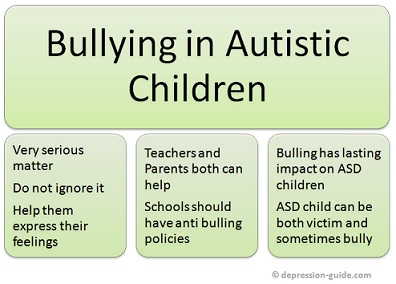Bullying and Autism
TweetBulling is a serious problem in the schools and colleges. It has started to show its presence in pre schools as well where big and strong kids try to gain power over the smaller ones. Bullying in itself can be in varied forms like physical or psychological. It involves a power fight and and hence imbalance. Kids who are suffering from ASD, are typically vulnerable to bullying due to lack of social abilities. They become the prime target of the bullies because of thier lack of interaction, social habits, etc.
The kids are more vulnerable in the early adolescence. These kids have very profound effect of bullying on them. It is a very serious matter and all the adults, be it parents, teachers, caregivers, etc. should take utmost care to identify the victims and help them in all possible ways.
Study on ASD kids Bullying
There was a study conducted on a group of 500 children suffering from Asperger Syndrome. These kids were 4 times more likely to be bullied as compared to non-ASD kids. The lack of communication and social interaction stand these kids out from others which make them more prone to bullying. They cannot make the difference between casual talk and bullying. They cannot identify the friends and foes.
There are instances where children with ASD bully others and they do it totally unintentionally. Bullying has to be dealt with strictly in the school and it should be unacceptable completely. It's occurence should not be common, but it should be rare in the schools.

Why kids with ASD are Vulnerable to Bullying?
Kids who are diagnosed with Autistic Spectrum Disorders have some of the following traits which causes them to become victim of bullying:
- They cannot communicate their thoughts and feelings freely
- They can't control the things happening around them.
- ASD kids have very poor self esteem and they always feel inadequate for the place, wherever they are.
- They can't judge the tone, attitude, expression of others, hence cannot tell if a person is behaving normally or he is bullying.
- They appear distressed and self-destructive
How Teachers Help ASD Bullying?
Teachers can help an ASD child from being bullied and save him from being victimized by peers. They can follow the simple rules as laid below:
- Use the school’s procedures and report the bullying behavior appropriately.
- Show compassion and empathy to the bullied child and ask him what has happened.
- If the ASD kids cannot tell, motivate him to write or draw or tell by gestures on what happened.
- You can highlight students who were friendly with classmates and acknowledge random acts of kindness.
- You can also distribute rewards for cards to students for their positive behaviour.
What parent can do for Bullied Child?
If you come to know that your child is being bullied by someone in the school, do not remain silent. Your silence is going to cost your child a nightmare.
- Write a letter to teacher, Principal or other authority to publish and tell the kids about the bullying policy of the school.
- Talk to your child on how he experience bullying.
- With the help of teachers and caregivers, identify the cause and find the alternate for the bully child. You can even talk to their parents as well with the help of teachers.


Sometimes crying or laughing
are the only options left,
and laughing feels better right now.

Current Issue
 Self Help Leaflets Take the help of our self help leaflets or booklets. |
 The DG Magazine All about living with depression |
Know more on Autism
- Autism Spectrum Disorders
- Autism Symptoms and Early Signs
- Autism Rating Scale
- Helping Children with Autism
- Repetitive Behavior
- Autism
- Autism in Early Years
- Autism Friendly Environment
- Bullying and Autism
- Living with Autism
- PDD - NOS
- Myths Facts and Statistics of Autism
- A guide for adults
- Can Autism be prevented?
- Speech problem with autism
- Autism and Ageing
- Medication for autism
- Treatment
- History
- Diagnosis
- Conditions associated with autism
- Sibling
- Autism and Stress
- Facts and Statistics
- How to Choose the Right School for Your Child With ASD












